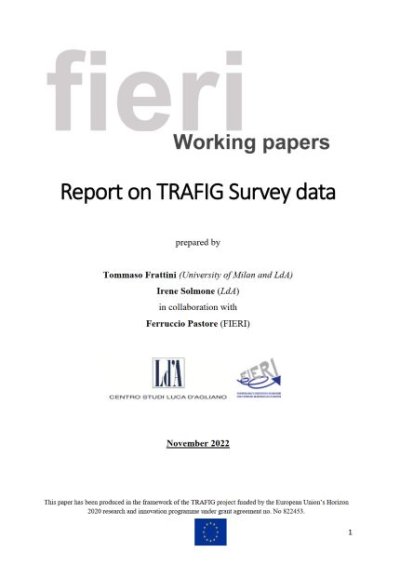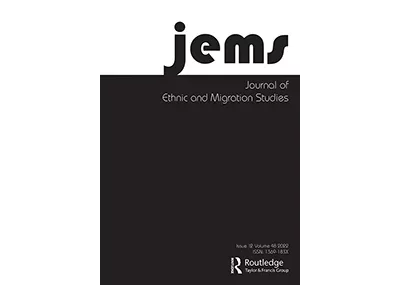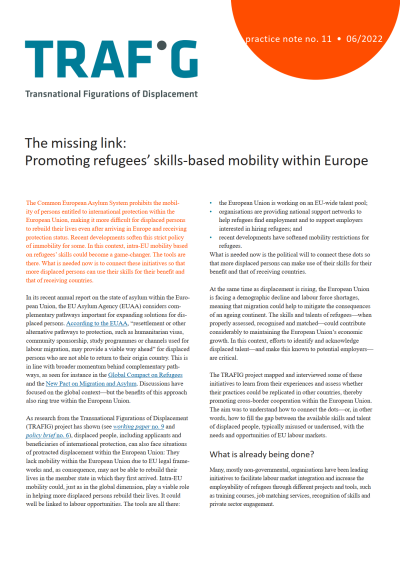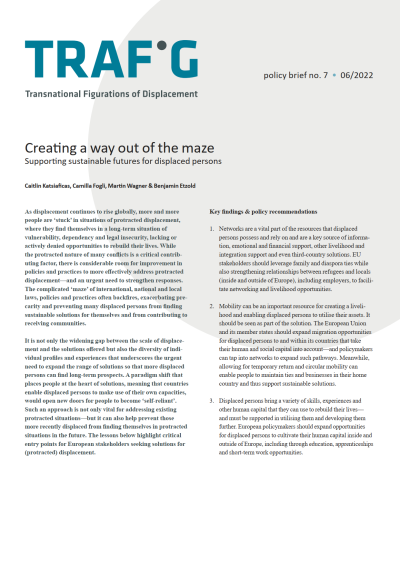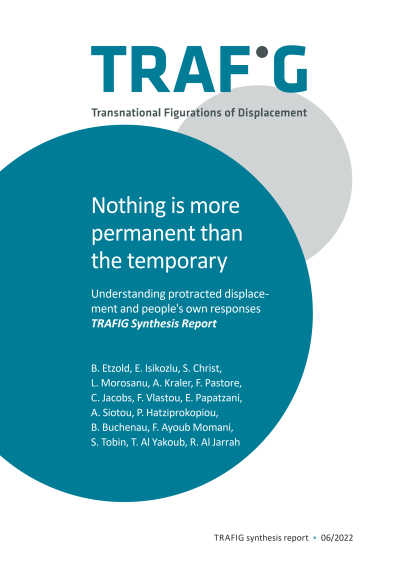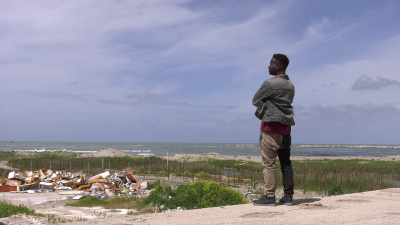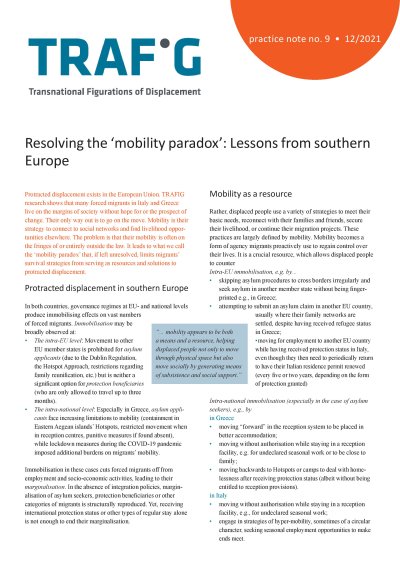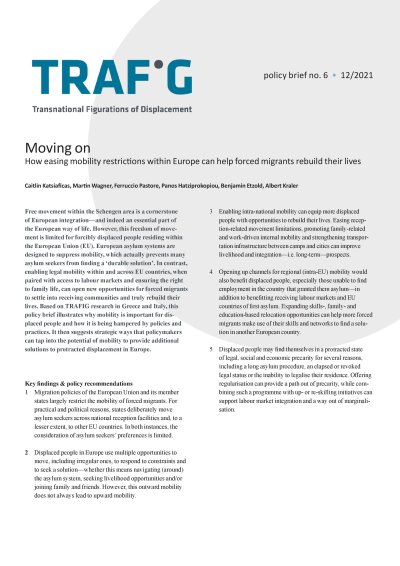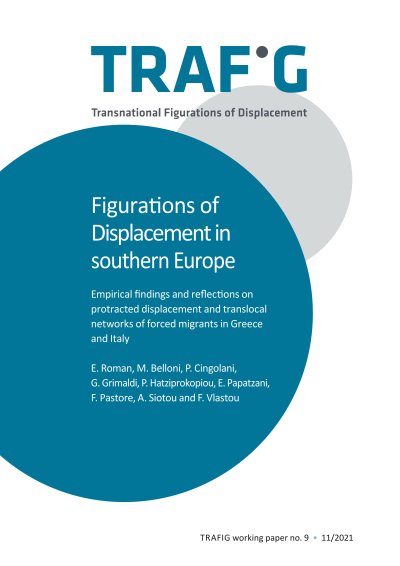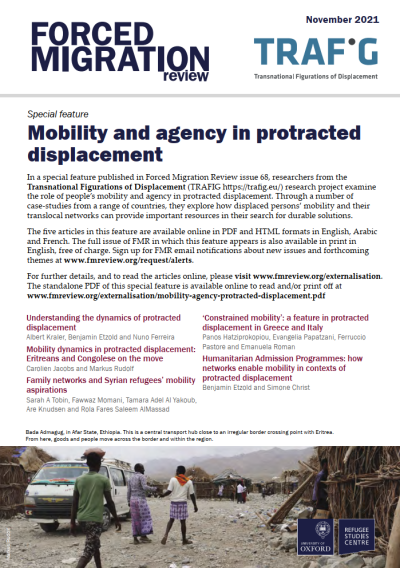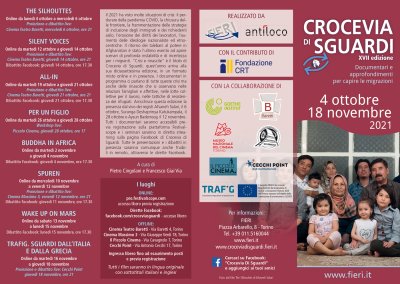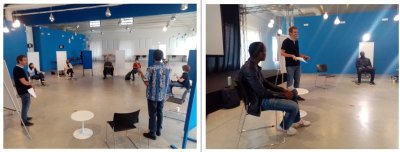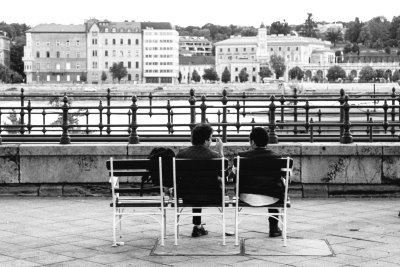Italy
Colleagues from FIERI (Forum of International and European Research on Immigration) investigated migrants’ marginalisation and conditions of protracted displacement across several sites in Italy. 540 people, mainly Eritreans, West Africans and South Asians, participated in the Italian study.
Special Issue in JEMS
Unsettling Protracted Displacement: Connectivity and Mobility beyond Limbo
Key results and reflections from the TRAFIG project have just been published in a special issue in the Journal of Ethnic and Migration Studies (JEMS).
The 9 contributions present novel insights of empirical research in African, Asian and European countries on the role of connectivity and mobility in the lives of displaced people, they critically engage with policies, legal frameworks and structures that keep displaced people in an ongoing state of limbo, they reflect upon the concept of protracted displacement and seek to advance its understanding, and they employ a figurational approach in their analysis.
All 9 articles are freely accessible via the publishers website: Read more
1 Introduction: Unsettling Protr
...TRAFIG practice note no. 11
The missing link
Promoting refugees’ skills-based mobility within Europe
The Common European Asylum System prohibits the mobility of persons entitled to international protection within the European Union, making it more difficult for displaced persons to rebuild their lives even after arriving in Europe and receiving protection status. Recent developments soften this strict policy of immobility for some. In this context, intra-EU mobility based on refugees’ skills could become a game-changer. The tools are there. What is needed now is to connect these initiatives so that more displaced persons can use their skills for their benefit and that of receiving countries. Read more
TRAFIG policy brief no. 7
Creating a way out of the maze: Supporting sustainable futures for displaced persons
As displacement continues to rise globally, more and more people are ‘stuck’ in situations of protracted displacement, where they find themselves in a long-term situation of vulnerability, dependency and legal insecurity, lacking or actively denied opportunities to rebuild their lives. Drawing lessons from more than 3 years of research, this policy brief highlights critical entry points for European stakeholders seeking solutions for (protracted) displacement. Read more
TRAFIG Synthesis report
'Nothing is more permanent than the temporary' – Understanding protracted displacement and people's own responses
Final report sums up findings of 3 1/2 years of TRAFIG research.
Across the world, 16 million refugees and an unknown number of internally displaced persons (IDPs) experience long-lasting conditions of economic precarity, marginalization, rightlessness and future uncertainty. They live under conditions of protracted displacement. Policy solutions often fail to recognise displaced people’s needs and limit rather than widen the range of available solutions.
This report brings together the central findings of the TRAFIG project’s empirical study in the Democratic Republic of the Congo (DRC), Ethiopia, Tanzania, Jordan, Pakistan, Greece, Italy and Germany. We... Read more
Screening of the TRAFIG documentary in Rome
On 22 April, an important dissemination and restitution event was held in Rome, one of the key sites for TRAFIG's Italian fieldwork see TRAFIG working paper 9.
Under the title, "Il mio posto è qui? Vivere da rifugiati in Italia" (Is my place here? Living in Italy as refugees), the homonymous documentary, which was produced by the film director Andrea Fantino and the FIERI team during empirical field work in 2021 was screened for one of the first times. The world première of the documentary was in Torino in November 2021 at the Film Festival "Crocevia du Sguardi".
The venue chosen for the film screening was very meaningful: Spin Time Labs is a large squat in the centre of Rome where hundreds of persons, including several migrants and refugees live with their families. Two of... Read more
TRAFIG at the “In Dialogue” Symposium organised by Indiana University
On 18/19 March 2022, colleagues involved in the TRAFIG project contribute to Indiana University’s “In Dialogue” Symposium, which focusses on transnational dynamics and repercussions of the movement of displaced peoples between Africa and Europe. In a session on “Constrained transnationalism: Experiences of displacement and ongoing limbo between Africa and Europe” Catherina Wilson (Leiden University), Janemary Ruhundwa (Dignity Kwanza), Benjamin Etzold (BICC), Markus Rudolf (BICC), Simone Christ (formerly BICC) and Pietro Cingolani (FIERI) will share insights from TRAFIG research in Tanzania, Ethiopia, Italy, the Netherlands and Germany.
Il mio posto è qui: Is my place here? Living as refugees in Italy
by Andrea Fantino, Italy, 2021
6 characters, 3 locations, one country: Italy. From North to South, from Cuneo to Castel Volturno, passing through Rome, “Is my place here?” collects the testimonies of refugees from sub-Saharan Africa that share their life path, conditioned by the precariousness of the Italian and European reception system. “Luck” and “will” – cornerstones within which to move one’s steps, according to one of the documentary’s protagonists – seem to dissolve in a time made of mobility and constraints, where institutions often do not help and inclusion in a new society is often in the care of individuals able to make a difference, or in the possibility of becoming political subjects in all respects, giving rise to a fight to conquer their spaces and thei... Read more
TRAFIG practice note no. 9
Resolving the ‘mobility paradox’ - Lessons from southern Europe
available in English, Italian, Greek
Protracted displacement exists in the European Union. TRAFIG research shows that many forced migrants in Italy and Greece live on the margins of society without hope for or the prospect of change. Their only way out is to go on the move. Mobility is their strategy to connect to social networks and find livelihood opportunities elsewhere. The problem is that their mobility is often on the fringes of or entirely outside the law. It leads to what we call the ‘mobility paradox’ that, if left unresolved, limits migrants’ own survival strategies from serving as resources/solutions to protracted displacement.
Based on the TRAFIG research in Italy and Greece - the results of which can... Read more
TRAFIG policy brief no. 6
Moving on
How easing mobility restrictions within Europe can help forced migrants rebuild their lives
Free movement within the Schengen area is a cornerstone of European integration – and indeed an essential part of the European way of life. However, this freedom of movement is limited for forcibly displaced people residing within the European Union (EU). European asylum systems are designed to suppress mobility, which actually prevents many asylum seekers from finding a ‘durable solution’. In contrast, enabling legal mobility within and across EU countries, when paired with access to labour markets and ensuring the right to family life, can open new opportunities for forced migrants to settle into receiving communities and truly rebuild their lives. Read more
TRAFIG working paper no. 9
Figurations of Displacement in Southern Europe
Empirical findings and reflections on protracted displacement and translocal networks of forced migrants in Greece and Italy
This working paper is based on empirical research on the Translocal Figurations of Displacement in Greece and Italy. The authors aim to compare protracted displacement in Greece and Italy, looking at the structural forces shaping it and their interactions with migrants’ mobility and connectivity. This comparison is based on the analysis of the relations between two contextual variables (governance regimes and host population) and three key variables (mobility, connectivity and marginalisation). In this paper, they present findings from three study sites in Greece and four research locations in Italy.
Findings sho... Read more
Mobility and agency in protracted displacement
Available in English, French and Arabic
The latest issue of the Forced Migration Review includes a special feature on mobility and agency for those living in protracted displacement, produced in collaboration with the TRAFIG project. Read more
- Understanding the dynamics of protracted displacement
- Mobility dynamics in protracted displacement: Eritreans and Congolese on the move
- Family networks and Syrian refugees’ mobility aspirations
- ‘Constrained mobility’: a feature in protracted displacement in Greece and Italy
- Humanitarian Admission Programmes: how networks enable mobility in contexts of protracted displacement
Release of two TRAFIG Documentaries at the Film festival "Crocevia du Sguardi" \
Throughout their fieldwork activities, the TRAFIG teams in Italy and Greece were accompanied by camera teams. Based on this footage, two video documentaries have been produced which capture the realities of persons affected by protracted displacement. The two documentaries "Is my place here? Living as a refugee in Italy" directed by Andrea fantino and "Crafting futures" directed by Michalis Kastanidis and Io Chaviara are available for free from Tuesday 16 November at 21:00 to Sunday 21 November at 24:00 here.
The Italian documentary "Is my place here? Living as a refugee in Italy" will be also live screened on Thursday November 18th, 9pm at Cecchi Point (Turin). The documentary will be discussed by Ferruccio Pastore (FIERI Director), Pietro Cingolani (University of Bologna... Read more
Which solutions for displaced people?
Insights from a multi-stakeholder community consultation in the city of Cuneo, in the Piedmont region (Italy)
By Pietro Cingolani (FIERI)
Introduction and context
On Friday, 23 May 2021, the Forum of International and European Research on Immigration (FIERI) team organised a multi-stakeholder community consultation (MSCC) in the city of Cuneo, in the Piedmont region. The first objective of this meeting was to share with the participants the results of the field research conducted in Cuneo and in other rural locations in the province of Cuneo, such as the town of Saluzzo and the surrounding villages. The second objective was to collect information from the participants on good policies and practices to improve the living and working conditions of migrants in protracted displ... Read more
Doing field research during a Pandemic: what TRAFIG researchers in Italy have learned
By Giulia Gonzales, Floriana Russo, Yonas Sium and Emanuela Roman, FIERI – Forum of International and European Research on Immigration
Between September 2020 and February 2021, the FIERI team implemented the TRAFIG survey in Italy. The survey was carried out by three interviewers, Giulia Gonzales, Floriana Russo and Yonas Sium, who focused mainly (but not exclusively) on three geographical areas: the north-west of Italy (mainly the city of Torino), the north-east of Italy, and the city of Rome. The target population included migrants in protracted displacement situations belonging to three main national/regional groups: West Africans, South Asians (Afghans and Pakistanis) and Eritreans. Notwithstanding the huge obstacles and difficulties posed by the second wave of the Coronavirus pand... Read more

